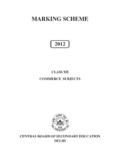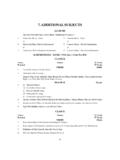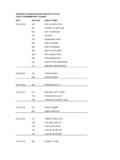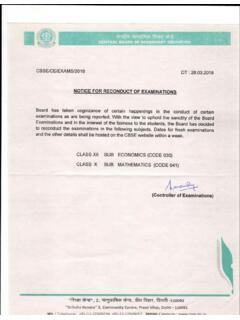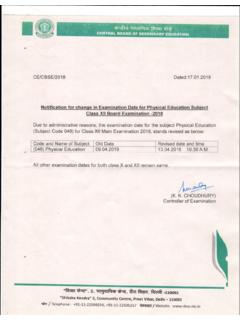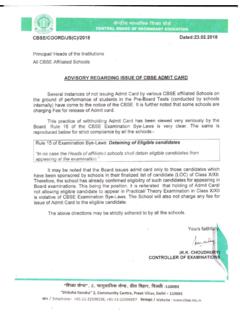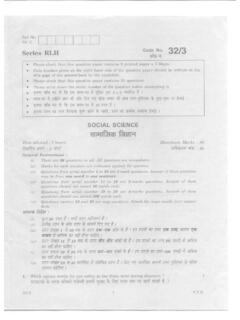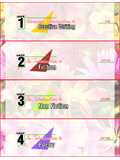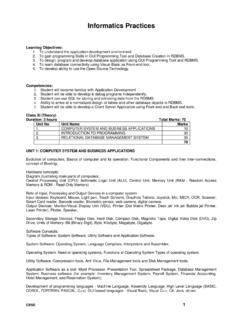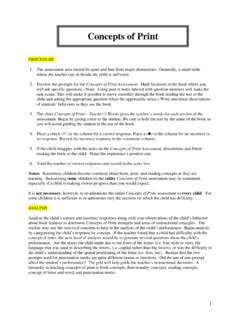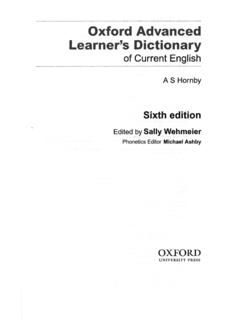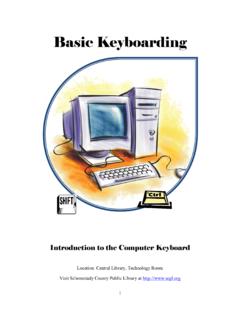Transcription of 1. English Communicative Code No. 101 CLASS - IX ...
1 11. English CommunicativeCode No. 101 CLASS - IXEXAMINATION SPECIFICATIONSD ivision of Syllabus for Term II (October-March)Total Weightage AssignedSummative Assessment II30%SectionMarksReading20 Writing25 Grammar20 Literature25 Formative Assessment20%TOTAL90 marks50% total weightage assigned to Summative Assessment (SA I&II) is 60%. The total weightageassigned to Formative Assessment (FA1, 2, 3, &4) is 40%. Out of the 40% assigned toFormative Assessment, 10% weightage is assigned to conversation skills (5% each in TermI&II) and 10% weightage to the Reading Project (at least 1 Book is to be read in each termand the Project will carry a weightage of 5% in each term). Summative Assessment I and Summative Assessment II is for ninety marks. The weighatgeassigned to Summative Assessment I is 30% and the weightage assigned to SummativeAssessment II is 30%.2 SECTION A: READING20 MarksQs1-3 The reading section will have three unseen texts as shown below:The total length of the three passages will be between 850 - 1100 words.
2 There will be at least 5marks for assessing vocabulary. All questions on vocabulary will not be from the same should be taken to cover all the three text types, ie factual, discursive and literary whileselecting the passages. A poem may or may not be used as one of the three texts. Apart from apoem, literary texts in prose may include excerpts from authentic literature such as short story,autobiography, biography, travelogue, novel a poem or a literary text is used, the other two texts should be discursive and factual,thus covering all the three text B: WRITING (25 Marks)The writing section comprises four writing tasks as indicated A short composition of upto 50 words in the form of a Notice, Message or Diary MarksQ5. A composition of upto 100 words in the form of biographical sketch, data interpretation,dialogue writing or description (people, objects or events)6 MarksText NumberText TypeLengthMarksType of Type(gap filling, sentencecompletion, tablecompletion, wordattack questions,reference and shortanswer questions)
3 ---- do -----10 Marks450 - 500 wordsFactual/Discursive/ LiteraryText 1 Text 2 Text 3 Factual/Discursive/ LiteraryFactual/Discursive/ Literary200 - 300 words200 - 300 case of a poem,it may be shorterthan 200 Marks5 MarksMultiple ChoiceQuestions3 Questions 4 & 5 will assess students' skill of expressing ideas in clear and grammatically cor-rect English , presenting ideas coherently and concisely, writing a clear description, a clear ac-count of events, expanding notes into a piece of writing, transcoding information from one formto another or using a style appropriate for a notice, message or diary extended writing task (length upto 120 words) in the form of a Formal/Informal Letter orEmail. The long piece of writing will assess the use of appropriate style, language, content An extended writing task (length upto 150 words) in the form of an Article, Speech, Report MarksStudents' skills of expressing ideas in clear and grammatically correct English , planning,organising and presenting ideas coherently by introducing, developing and concluding a topic,comparing and contrasting ideas and arriving at a conclusion, presenting an argument withsupporting examples, using an appropriate style and format and expanding notes into longerpieces of writing and creative expression of ideas will be 6 & 7 will make use of a visual/ verbal Note on Format and Word Limit:lFormat will not carry any separate marks and in most cases, format will be given in thequestion word limit given is the suggested minimum word limit.
4 Candidates must not bepenalised for writing more or less than the suggested word limit provided the topic iscovered adequately. Stress should be on content, expression, coherence and relevance ofthe content C: GRAMMAR (20 Marks)This section will assess Grammar items in context for 20 Marks. It will carry 5 questions of 4marks 8 & 9 will have Multiple Choice Questions. The test types for MCQs includethe following:lGap fillinglSentence completionlDialogue completionQuestions 10,11 & 12 will be based on response supplied by students (supply type).The test types will include the following:4lSentence reorderinglEditinglOmissionlSentence transformationQuestions 8 to 12 will test grammar items which have been dealt with in CLASS IX. Differentstructures such as verb forms, sentence structure, connectors, determiners, pronouns, preposi-tions, clauses, phrases etc., can be tested through formative assessment over a period of far as the summative assessment is concerned, it will recycle grammar items learntover a period of time and will test them in types used will include gap-filling, cloze (gap filling exercise with blanks at regular inter-vals), sentence completion, recording word groups into sentences, editing, dialogue-comple-tion and grammar syllabus will be sampled each year, with marks allotted for:Verbs formsSentence structuresOther areasNote: Jumbled words in reordering exercise to test syntax will involve sentences in a context.
5 Eachsentence will be split into sense groups (not necessarily into single words) and jumbled D: LITERATURE(25 Marks)Q13. will have the following arrangement:13 A: An extract from poetry with three Multiple Choice Questions based on reference Marks13 B: An extract from a short story with three reference to context questions requiring thestudents to supply the Marks13 C: An extract from a play with three reference to context questions requiring the students tosupply the out of five short answer type questions based on prose, poetry and play of 2 markseach. The questions will not test recall but will test inference and evaluation.(30-40 words each)8 out of two long answer type questions to assess personal response to text (story, poem orplay) by going beyond the text/ poem/story or extract. Creativity, imagination and extrapolationbeyond the text and across two texts will also be assessed.
6 (150 words) 8 MarksPrescribed Books/ Materials1. Interact in English - IX Main Course Book (revised edition)2. Interact in English - IX Literature Reader (revised edition)Published by CBSE3. Interact in English - IX Workbook (revised edition)Delhi-110092 Reading Section:Reading for comprehension, critical evaluation, inference and analysis are skills to be testedformatively as well as summatively. There will be no division of passages for this section, how-ever, for reading purpose. The Interact in English Main Course Book will be read in two Term I (April-September) and Term II (October-March).Writing Section:All types of short and extended writing tasks will be dealt with in both I and II Term Summative aswell as Formative Assessment. For the purpose of assessment all themes dealt with in the MainCourse Book and other themes of current interest may be on assessing Writing Content:2 marks Expression:2 marks (accuracy & fluency) Total:4 marksUpto one mark may be deducted for spelling, punctuation and grammar Content:3 marks Fluency:2 marks Accuracy:1 mark Total:6 marksUpto one mark may be deducted for spelling, punctuation and grammar Content:3 marksAccuracy:2 marksFluency:2 marksTotal:7 marks6 Upto two marks may be deducted for spelling, punctuation and grammar Content:4 marksAccuracy:2 marksFluency:2 marksTotal:8 marksUpto two marks may be deducted for spelling, punctuation and grammar marks have been allotted specifically for content, they should not be awarded in a me-chanical manner.
7 For instance, if a student has merely mentioned the value points (content) asper the marking scheme, the examiner should assess whether the content has been expressed/communicated in a coherent and cohesive manner. It means content and expression areperceived as interlinked aspects of in all the writing tasks credit should be given to creativity in the realm of ideas andlanguage use. What it means for the examiner is that students who think differently and are ableto use the language with felicity in terms of structures as well as vocabulary should be given dueweightage. This need not necessarily be seen as leaning towards subjectivity in proper balance of content, expression (accuracy, fluency, cohesion and coherence)and creativity would encourage students to aim for higher standards in written in spelling, punctuation and grammar should be penalised to the extent of marks allottedfor accuracy.
8 ( the penalty should not exceed 2 marks).Grammar:Grammar items mentioned in the syllabus will be taught and assessed summatively as well asformatively over a period of time. There will be no division of syllabus for Grammar in thesummative and formative assessments for the terms. However a suggested split - up of theWork Book for the two terms is given to help teachers in planning their classroom IX- Communicative Syllabus for the Two I Taught My Grandmother to Read442. A Dog Named Duke443. The Man Who Knew too Much444. Keeping it from Harold445. Best Seller44 POETRY1. The Brook442. The Road Not Taken443. The Solitary Reaper444. Lord Ullin's Daughter445. The Seven Ages446. Oh, I Wish I'd Looked After Me Teeth447. Song of the Rain44 DRAMA1. Villa for Sale442. The Bishop's Candlesticks44 Main Course Book1. People442. Adventure443. CLASS IX Radio and Video Show44S. No. Text BooksFirst Term(April - September)Second Term(October - March)Literature ReaderPROSEFA 1 10FA 2 10SA I 30 FA 3 10 FA 4 10 SA II 3085.
9 Mystery446. Children447. Sports and Games44 WORK BOOK* - Suggested Break-up of Units for the Purpose of Classroom Teachingonly - NOT FOR TESTING (see the note below) Term I1. Verb Forms2. Determiners3. Future Time Reference4. ModalsTerm II5. Connectors6. The Passive7. Reported Speech8. PrepositionsNOTE ON WORKBOOKThe suggested split up of the units of the Workbook reflects a distribution for the purpose ofclassroom teaching only. Since grammar and usage is not to be tested directly, but in anintegrated manner, the split up as shown above will not restrict questions in the gram-mar section of SA I and SA II question papers to the specific units shown in the split upof Workbook units. Grammar will be tested by recycling grammar items learnt over a periodof time in a comprehensive manner. Teachers may adapt this suggested distribution for CLASS -room teaching making modifications according to their specific needs.
10 Similarly FormativeAssessment of grammar items may also be carried out in an integrated manner along with theskills of Reading, Writing, Speaking and Listening as well as :1. Formative Assessment is assessment 'for' learning. Thus schools may adapt the abovebreak-up as per their All activities related to Formative Assessment such as language games, quizzes, projects, roleplays, dramatization, script writing etc must be done as 'in CLASS ' and 'in school' activities. Incase, a field survey or visit is taken up it must be under the direct supervision of the ASSESSMENT- IISAMPLE PAPERCLASS IXENGLISH COMMUNICATIVEM aximum marks: 90 Time-3 hoursThe question paper is divided into four A:Reading Comprehension20 marksSection B : Writing25 marksSection C :Grammar20 marksSection D :Literature25 marksSECTION A(READING - 20 MARKS)Q1. Read the following passage carefully:(10 marks)lOur house is filled with photos.
